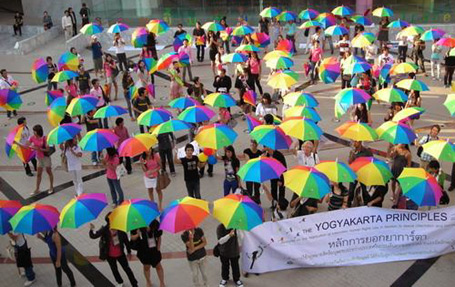It was held in the shopping heart of Bangkok, surrounded by Siam Square, Siam Centre, Discovery Centre, MBK and Paragon. We gathered in a small plaza in front of the Lido movie theatre, with our own stage, seating and tables. Saturday shoppers streamed past on the sidewalk. Paragon Centre, with its Prada and Gucci stores, was across the street.

From the top: Former senator Jon Ungpakorn, audience seated outside the Lido Theatre, Prof Vitit Muntarbhorn holding up the book with the Thai translation of the Yogyakarta Principles, and pictures of umbrellas on the crowded Bangkok sidewalks.
The program began with lively game show contests. Then four notable Thai speakers. Former senator Jon Ungpakorn, something of a liberal hero in contemporary Thailand. Dr Seri Wongmontha, the pioneering gay activist, who lost his job at Thammasat University years ago for his advocacy. Professor Vitit Muntarbhorn, UN expert and co-chair of the meeting that drafted the Yogakarta Principles.
The fourth speaker was Alisa Phanthusak. She runs the famous Tiffany Theatre in Pattaya, the pioneering transvestite cabaret show in the country. It is famous throughout Thailand for its annual Miss Tiffany contest, a TV special.
Alisa, as a member of the Constitutional Drafting Assembly in 2007, led the campaign to have a reference to sexual diversity included in the revised constitution. While that effort failed, it marked her emergence as a public voice for LGBTI rights in the country.
Signatures were gathered urging Thailand to add it support to the French statement on LGBTI rights, to be made in the UN General Assembly in a couple of weeks. Insiders said that the government had already decided - again - to be 'neutral' on LGBTI issues at the UN. At least they will know that local organisations are asking for more.
The most serious part of the program over, it was time for a mix of panels and entertainment (dancers, performance artists and lip-synch cabaret). In between cabaret performances, a panel chaired by psychiatrist Dr Sukamon Wipaweeponkul had individuals talking about 'coming out' to their parents.
The endgame was a parade with everyone carrying matching rainbow umbrellas. We fought our way through the shopping crowds to overhead walkways. The destination was the classy plaza in front of the new Bangkok Art and Cultural Centre, a block away.
There the day ended, with everybody taking pictures of everybody else. Over there was Sisters, the Pattaya kathoey organisation. Over here was SWING, focused on male sex workers. Pioneering lesbian activists Tang and Lek posed. Miss Tiffany and Miss Alcazar added their elegance to the event.
The rainbow umbrellas had given us high visibility, but only for a short while. The English language Bangkok newspapers gave the event no coverage. They were full of stories of the siege going on at the international airport, the ongoing Thai political crisis and international economic woes.
Only the weekly LGBTI page in The Nation Media Group's Daily Express tabloid, announced it in advance, and reported on it afterwards.
Bangkok had Thailand's first "pride parade" in 1999, largely sponsored by local gay businesses. But there were no pride parades in 2007 or 2008. Sexual Diversity day has now taken their place, and promises to be an annual event. Rather nicely, it leads into World AIDS Day (December 1) and international Human Rights Day (December 10).
Douglas Sanders is a retired Canadian law professor, living in Thailand. He can be contacted at sanders_gwb @ yahoo.ca.
News bulletin on Thai PBS (Public Broadcasting Service, in Thai)












 打印版本
打印版本












读者回应
I have never been to Thailand, but if I ever go, I am sure I would feel comfortable in such a society.
well done.
Thank you for this report!
请先登入再使用此功能。